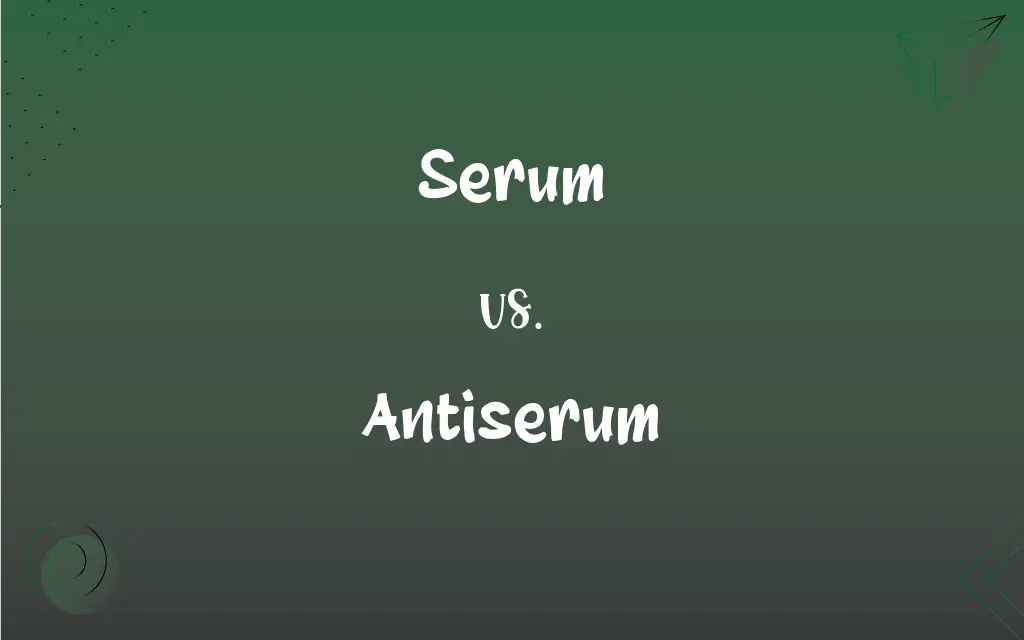Serum vs. Antiserum: What's the Difference?
Edited by Aimie Carlson || By Harlon Moss || Published on February 24, 2024
Serum is the liquid part of blood without clotting factors. Antiserum is serum containing antibodies against specific antigens.

Key Differences
Serum is the component of blood that remains after clotting has occurred, devoid of blood cells and clotting factors. Antiserum, on the other hand, is a type of serum that specifically contains antibodies against certain antigens, used for immunization and treatment purposes.
Serum is used in diagnostic tests and blood typing due to its content of various proteins, hormones, electrolytes, and antibodies. Antiserum is primarily used for its therapeutic and prophylactic properties, as it provides passive immunity against specific pathogens or toxins.
In medical research and clinical diagnostics, serum serves as a source for detecting various biomarkers. Antiserum is used in research to study immune responses and in vaccine development, owing to its antibody content.
Serum is obtained by allowing blood to clot and then centrifuging it to separate the liquid portion. Antiserum is produced by injecting an animal with a specific antigen, then collecting and processing its blood to obtain the antibody-rich serum.
Serum naturally contains a mix of antibodies, it does not necessarily target specific diseases. Antiserum is specifically created to target particular diseases, making it crucial in specific immunotherapy and emergency treatments.
ADVERTISEMENT
Comparison Chart
Definition
Liquid part of blood without clotting factors
Serum with antibodies against specific antigens
Primary Use
Diagnostic tests, blood typing
Immunization, therapeutic treatments
Composition
Various proteins, hormones, antibodies
Concentrated specific antibodies
Production Method
Clotting and centrifuging blood
Induced production of antibodies in animals
Specificity
Contains a mix of antibodies
Targeted against specific diseases
ADVERTISEMENT
Serum and Antiserum Definitions
Serum
Serum is used in serological testing to detect immune responses.
Her serum was tested for antibodies to the virus.
Antiserum
Antiserum provides passive immunity against certain diseases.
Rabies antiserum can prevent the disease after exposure.
Serum
Serum contains proteins, electrolytes, antibodies, antigens, and hormones.
Serum electrolyte levels are crucial for diagnosing kidney issues.
Antiserum
Antiserum is serum containing specific antibodies against an antigen.
The antiserum was used to treat the snakebite.
Serum
Serum is used in diagnostic laboratories for various tests.
The serum sample was sent for hormonal analysis.
Antiserum
Antiserum is crucial in vaccine development and immune response studies.
Researchers used antiserum to study the vaccine's effectiveness.
Serum
Serum does not contain any blood cells or clotting factors.
Serum differs from plasma in that it lacks clotting factors.
Antiserum
Antiserum is produced by immunizing animals with specific antigens.
The laboratory produced antiserum by injecting sheep with the virus.
Serum
Serum is the clear liquid that separates from clotted blood.
The lab used my blood serum for various tests.
Antiserum
Antiserum is used in immunotherapy and emergency treatments.
The hospital administered diphtheria antiserum to the patient.
Serum
The clear yellowish fluid obtained upon separating whole blood into its solid and liquid components after it has been allowed to clot. Also called blood serum.
Antiserum
Human or animal serum containing antibodies that are specific for one or more antigens.
Serum
Blood serum from the tissues of immunized animals, containing antibodies and used to transfer immunity to another individual.
Antiserum
(medicine) A serum prepared from human or animal sources containing antibodies able to counter certain diseases or toxins.
Antiserum
Blood serum containing antibodies against specific antigens; provides immunity to a disease
FAQs
What is antiserum?
Antiserum is serum containing specific antibodies against an antigen.
How is serum obtained?
By allowing blood to clot and then separating the liquid portion.
Does serum contain antibodies?
Yes, but a mix of various antibodies without specificity.
What is serum?
Serum is the liquid portion of blood without clotting factors.
What diseases can antiserum treat?
Diseases like rabies, snakebites, and diphtheria.
What is the main use of antiserum?
For passive immunization and treatment against specific diseases.
Can serum be used for blood typing?
Yes, it's used in blood typing and other diagnostic tests.
What's in serum besides antibodies?
Proteins, hormones, electrolytes, and antigens.
How is antiserum produced?
By immunizing animals with specific antigens and collecting their serum.
Is antiserum used in vaccine development?
Yes, it's important for studying immune responses and vaccine efficacy.
Can serum diagnose infections?
Serum can be used to detect antibodies indicating infections.
Can human serum be used for therapy?
It's mainly used for diagnostics, not typically for therapy.
What animals are used to produce antiserum?
Commonly horses, sheep, and rabbits.
Are clotting factors present in serum?
No, clotting factors are removed in serum.
How long does protection from antiserum last?
It offers short-term protection, as it provides passive immunity.
Are there risks in using antiserum?
There are risks like serum sickness and allergic reactions, especially with cross-species antiserum.
Can antiserum cause allergic reactions?
Yes, especially if derived from a different species.
How specific is antiserum?
Antiserum is specific to the antigens it's developed against.
Is antiserum the same as a vaccine?
No, antiserum provides passive immunity, while vaccines induce active immunity.
Is serum used in allergy testing?
Yes, it's used in various serological allergy tests.
About Author
Written by
Harlon MossHarlon is a seasoned quality moderator and accomplished content writer for Difference Wiki. An alumnus of the prestigious University of California, he earned his degree in Computer Science. Leveraging his academic background, Harlon brings a meticulous and informed perspective to his work, ensuring content accuracy and excellence.
Edited by
Aimie CarlsonAimie Carlson, holding a master's degree in English literature, is a fervent English language enthusiast. She lends her writing talents to Difference Wiki, a prominent website that specializes in comparisons, offering readers insightful analyses that both captivate and inform.






































































